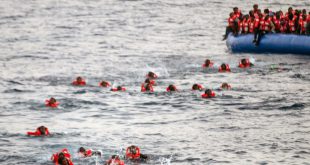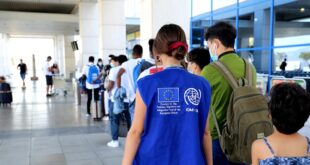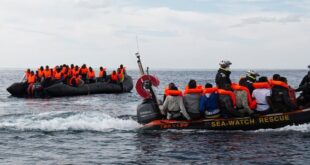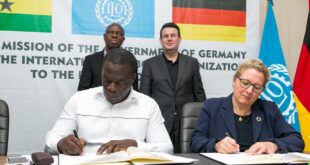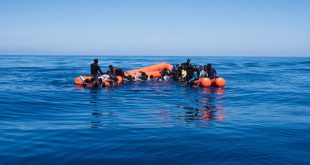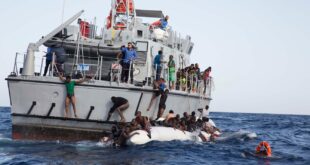European governments are “complicit” in grave human rights violations in Libya through their support for authorities there that often work with people smugglers and torture refugees and migrants, Amnesty International says. Nikolaj Nielsen reports.
The EU and its respective member states are complicit in the abuse and torture of migrants in Libya, says Amnesty International. The NGO’s Europe director John Balhuisen told reporters in Brussels on Monday (11 December) that the EU, and its member states led by Italy, are flouting human rights obligations by helping Libyans return migrants to the country.
“When you partner with a partner who is itself a partner with criminals, and you turn a blind eye to those crimes, you certainly become in some sense a partner to those crimes,” he said.
Balhuisen described the cooperation with Libyan authorities “as a Faustian pact that European governments have agreed to pay.”
He noted that criminal gangs work closely with Libyan officials in a common effort to make money out of human misery.
Libya jails anyone who enters, stays, or attempts to exit the country without proper paper work in what Amnesty describes as the country’s primary migration management tool.
The scheme as a whole, he said, is designed to contain people in Libya who are then exploited, abused, and often tortured in any number of government-run detention centres.
Around 20,000 people are estimated to be locked up in Libyan detention centres, under the authority of the DCIM, a division in the ministry of interior. Thousands more are thought to meet a similar fate in centres run by militias and criminal gangs.
A 63-page report published by Amnesty on Tuesday (12 December) provides a long rap sheet of collusion against Europe-bound refugees and migrants.

A paid-off coastguard is said to allow marked boats to slip through towards Italy. Those that do not pay are apprehended and returned to Libya and the migrants detained / Photo: © UNHCR
It notes, among other things, collusion between the Libyan coast guard, which are in part trained by the EU’s naval operation, EU Navfor Sophia, and smugglers.
A paid-off coastguard is said to allow marked boats to slip through towards Italy. Some are even escorted into international waters. Those that do not pay are apprehended and returned to Libya and detained.
Three-pronged approach
The report says European government cooperation with Libyan authorities is geared around a three-pronged approach.
First, they enable the Libyan coastguard to intercept an increasing number of people by providing extra training, equipment, and boats while at the same imposing restrictions on NGO rescue vessels.
Second, they provide both technical support and assistance to Libyan authorities that manage detention centres where migrants and refugees are exposed to abuse.
Third, they struck deals with local Libyan authorities and leaders of tribes and armed groups to get them to carry out border controls instead of smuggling people.
At the same time, the report says the EU and respective national governments have no plan to secure the release of the migrants from the detention centres.
It notes the Libyan government has done nothing to abolish a system of automatic detention or enabled the UN refugee agency (UNHCR) to carry out its full mandate in the country.
“These requirements have not been set by European governments as conditions for their cooperation,” said Matteo de Bellis, a co-author of the report.
De Bellis noted that Italy has in the past already flouted human rights of migrants after having pushed back people to Libya in 2009 and 2010.
The move was widely condemned with the European Court of Human Rights in 2012 issuing a ruling against Italy.
He said Italy is now implementing the same the policy but through different means by attempting to circumvent the court’s obligations by instead “enlisting the Libyan coastguard to do what they cannot clearly do.”
EU in Libya
The EU says it wants, in collaboration with the African Union and the United Nations, to set up a task force to expedite the safe return of people stuck in Libya to their home countries.
The International Organization of Migration (IOM), through funds provided by the EU, has helped return some 14,000 people this year. The EU wants to bankroll another 15,000 returns by next February.
It also says that some €120 million in assistance to Libya is designed to support a whole array of programmes from civil society to security. Around €30 million in humanitarian funding is also supposed to help Libyans displaced by conflict.
Over 33,200 refugees and migrants arrived in Italy between July and November this year, 67-percent drop when compared to the same period in 2016.
© EUobserver
READ ALSO 80% of migrants treated by Rome clinic are torture victims
 THE AFRICAN COURIER. Reporting Africa and its Diaspora! The African Courier is an international magazine published in Germany to report on Africa and the Diaspora African experience. The first issue of the bimonthly magazine appeared on the newsstands on 15 February 1998. The African Courier is a communication forum for European-African political, economic and cultural exchanges, and a voice for Africa in Europe.
THE AFRICAN COURIER. Reporting Africa and its Diaspora! The African Courier is an international magazine published in Germany to report on Africa and the Diaspora African experience. The first issue of the bimonthly magazine appeared on the newsstands on 15 February 1998. The African Courier is a communication forum for European-African political, economic and cultural exchanges, and a voice for Africa in Europe.




